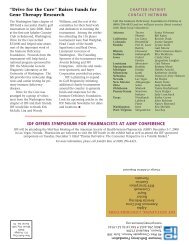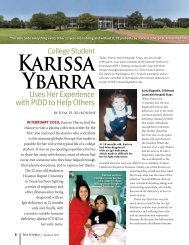IDF Patient & Family Handbook for Primary Immunodeficiency ... - IDFA
IDF Patient & Family Handbook for Primary Immunodeficiency ... - IDFA
IDF Patient & Family Handbook for Primary Immunodeficiency ... - IDFA
Create successful ePaper yourself
Turn your PDF publications into a flip-book with our unique Google optimized e-Paper software.
Infants and Children with <strong>Primary</strong> <strong>Immunodeficiency</strong> Diseases<br />
105<br />
Introduction<br />
If your child has received the diagnosis of a<br />
primary immunodeficiency disorder, it is important<br />
to understand the role you will play in the child’s<br />
future. It would be nice to think you could adjust<br />
to this new role slowly, however, unless there is a<br />
family history, you are presented with a number of<br />
new challenges with little preparation. One of your<br />
first challenges is to minimize the impact of chronic<br />
illness upon the child’s life without compromising<br />
their care.<br />
Once the diagnosis of a primary immunodeficiency<br />
has been made, children must learn how to live<br />
with this diagnosis on a daily basis. Although having<br />
a primary immunodeficiency disease is a chronic<br />
disorder, the symptoms and their impact on the child<br />
will vary considerably. The diagnosis of a primary<br />
immunodeficiency does not mean that the child<br />
will be sick every day. Most diagnosed children will<br />
continue to play, go to school and socialize normally.<br />
Understanding the diagnosis, using preventive<br />
measures, and communicating with medical<br />
professionals will help you, your child, and your<br />
family live with this chronic health condition.<br />
The family as a whole is affected by any chronic<br />
illness and should be encouraged to participate<br />
in decision-making events that affect the family<br />
unit. <strong>Family</strong> stresses on top of those encountered<br />
while managing chronic illnesses can be minimized<br />
if recognized early and addressed immediately.<br />
Communication with all parties is essential.<br />
Dealing with a chronic illness in an infant or child<br />
can be very emotional. Fear of the unknown can<br />
be one of the most prevalent emotions, but can be<br />
easily controlled with education. If you want your<br />
child to grow up and be able to handle their own<br />
care, lead by example. Don’t feel ashamed to seek<br />
help from medical professionals or others in your<br />
situation, and look <strong>for</strong> credible in<strong>for</strong>mation sources.<br />
Coordinating Your Child’s Care<br />
When your child is diagnosed with a primary<br />
immunodeficiency disease, you become part of<br />
your child’s health management team and his or<br />
her primary advocate. Your role in monitoring your<br />
child’s symptoms and responses to treatments and<br />
communicating your observations and concerns<br />
is vital to the medical team’s assessment and<br />
treatment of your child. In many cases, more than<br />
one physician will be involved in caring <strong>for</strong> your child;<br />
there<strong>for</strong>e, coordinating communication and keeping<br />
comprehensive and accurate records of your child’s<br />
medical course is essential. Many parents suggest<br />
that a diary is an invaluable tool to document events<br />
affecting your child’s medical care.<br />
Recommendations <strong>for</strong> items to be kept in the<br />
diary include:<br />
• A brief history leading to the diagnosis that can<br />
be written by the parent or a physician<br />
• Copies of laboratory evaluations confirming<br />
the diagnosis<br />
• A current list of physicians caring <strong>for</strong> the child<br />
with up-to-date addresses and phone numbers<br />
• A chronology of important events, specifically<br />
noting types of treatment and therapy, changes<br />
in therapy and subsequent responses to<br />
that therapy<br />
• A current up to date list of the child’s medications<br />
• Allergies to medications<br />
• An immunization record or lack of immunization<br />
• Current insurance in<strong>for</strong>mation<br />
• Explanation of benefits records can be kept in<br />
the diary or separately, but should be<br />
periodically reviewed <strong>for</strong> accuracy<br />
Insurance concerns that arise are more easily<br />
resolved through the use of the diary. The diary may<br />
be especially useful if the child should need to see<br />
a new physician, especially in an emergency. This<br />
<strong>for</strong>m of accurate in<strong>for</strong>mation shortens the lengthy,<br />
often repeated history-taking sessions by new<br />
physicians, allowing <strong>for</strong> more time to focus on the<br />
immediate issue at hand. It is wise <strong>for</strong> more than<br />
one person in the family to be aware of the child’s<br />
medical routine. A well-documented diary can be<br />
extremely helpful <strong>for</strong> those times when the child is in<br />
the care of caregivers other than parents.
















